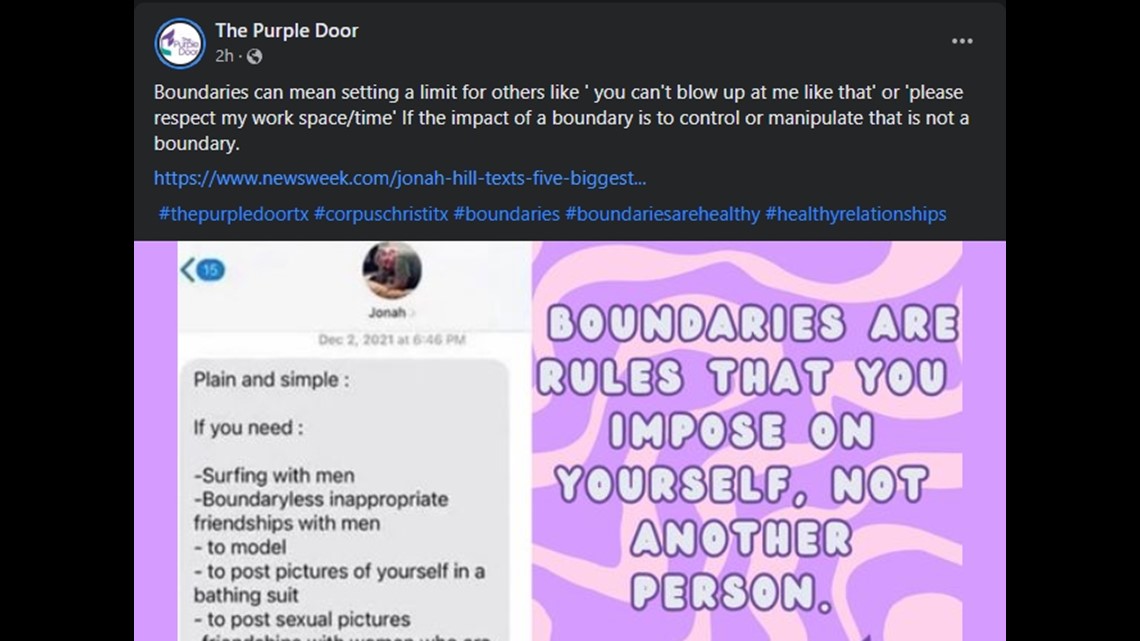CORPUS CHRISTI, Texas — Conversations about emotional abuse took over social media after the ex-girlfriend of Jonah Hill posted what she called abusive messages from him.
Some commented on posts about the messages and said that it was fine that he was setting boundaries for his relationship, but a domestic violence shelter in Corpus Christi disagrees.
"Boundaries are rules that you impose on yourself, not another person," The Purple Door posted to Facebook. "If the impact of a boundary is to control or manipulate, that is not a boundary."


Setting healthy boundaries
Boundaries can be emotional, physical and digital, according to LoveIsRespect.org, which is a project by the National Domestic Violence Hotline which offers information and support who have questions or concerns about their relationships.
"Boundaries help you honor your own needs and feelings by defining what you are comfortable with and how you’d like to be treated by others," the organization said.
Emotional Boundaries
Emotional boundaries are about trust, LoveIsRespect.org explains. They advise asking yourself these questions to determine trust level in your relationship:
- Is my partner supportive of me and my decisions for myself, both physically and emotionally?
- Is my partner consistent in their actions and behaviors?
- Does my partner demonstrate their trustworthiness by acting in accordance with what they say?
- Are you both able to comfortably spend time apart from one another?
If you feel unable to trust yourself or other people right now, it might not be the best time for you to be in a relationship, the organization said.
Physical Boundaries
Physical boundaries are equally as important in relationships.
"In a healthy relationship, partners know how far the other wants to go based on open communication, and they feel comfortable communicating with each other if something changes," the organization explains.
Always remember, the organization said, sex is not currency and your partner should not use sex to claim that you don’t care about them.
If you need some guidelines about communication with your partner, the organization suggests:
- Find the right time. Talk to your partner when you are both calm and undistracted.
- Talk face-to-face. Writing, including texts, can be subject to misinterpretation. Write your thoughts down ahead of time if you need to, but talk about them face-to-face.
- Don't attack each other. Language can sometimes come across as harsh. Don't use "you" statements. Try to center your relationship together.
- Be honest. The truth can hurt, but no one is perfect. Holding yourself accountable can strengthen your relationship.
- Check your body language. Give your partner your full attention. Sit up, face them directly and make eye contact.
- Use the 48-hour rule. You don't have to let your partner know they have upset you right away. Process your feelings for 48 hours before bringing up an issue.
Digital Boundaries
"The line between healthy and unhealthy relationships can get confusing once online. It’s not always clear what your digital boundaries or relationship should look like," LoveIsRespect.org explained.
Here's what the organization suggests asking yourself when setting digital boundaries in a relationship:
- Is it okay to tag you in posts or check-in places together?
- Do we post our relationship status publicly?
- Is it okay to follow or friend other people in my life?
- What are the expectations for communication through texting or social media?
- Is it okay to use each other’s devices, and when if so?
- Is it okay to post about our relationship publicly?
These boundaries can change during a relationship. Both you and your partner should openly discuss changing wants and needs.
Unhealthy boundaries
"If your partner is repeatedly crossing your boundaries, they aren’t willing to discuss boundaries with you, or you notice that your partner is guilt-tripping you for even having boundaries, your relationship is likely very unhealthy and could become abusive if your partner’s behaviors continue and escalate," the organization explained.
A common sign your partner is abusing you is control and manipulation.
"If you can’t express yourself without fear of retaliation, you may be experiencing abuse," the organization said.
Signs of abuse can include:
- Checking your phone, email, or social media accounts without your permission.
- Putting you down frequently, especially in front of others.
- Isolating you from friends or family (physically, financially, or emotionally).
- Extreme jealousy or insecurity.
- Explosive outbursts, temper, or mood swings.
- Any form of physical harm.
- Possessiveness or controlling behavior.
- Pressuring you or forcing you to have sex.
If you or someone you know is in a domestic violence situation, help is available. Call the National Domestic Violence Hotline anytime at 800-799-7233. You can also text "START" to 88788 to be connected with a support team.



